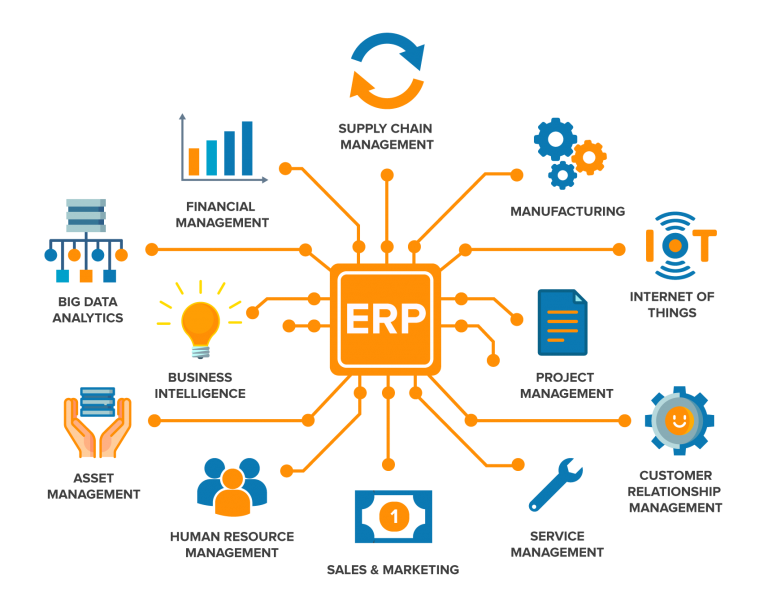Entrepreneurship brings a rapid shift in mindset in the person who is starting up. When you are an employee, you look forward to the month-end when the salary gets credited to your account but once you are an entrepreneur, you look for avenues to expand your business. Networking events, startup events, business meetings, trade shows, etc. are some of the places where business owners get opportunities to meet fellow entrepreneurs and pitch their products/services.
Many experienced business owners whose company has decent turn-over still do not make use of Enterprise Resource Planning (ERP) software. This is especially true for businessmen who are not in the technology business. They believe that they are not technologically advanced and making use of ERP software might turn into a nightmare for them. That is not true!
By the end of this article, business owners will come to know about the benefits of using ERP software as it clears the myths that they have in their minds.
What is ERP?
Before we dig deep into What is ERP, it is important to touch upon an important aspect of the business. No matter whether a business is big or small, it involves different business functions – Purchase, Inventory, Sales, Payroll, etc. You might not be aware of these terminologies but any business owner has to look into these activities regularly.
Instead of having a separate system to manage these things, ERP integrates all these blocks under a single software package. You may ask – what is special about ERP?. ERP is not only an amalgamation of these software blocks but it also helps the business owner make informed decisions based on the data being generated by the blocks.
In a nutshell, ERP brings the much-needed layer of BI (Business Intelligence) into your day-to-day operations.
Why should you use ERP for the business?
Enterprise Resource Planning (ERP) software is used for managing different business functions and take necessary actions based on the information being provided in the reports.
Some of the core modules in ERP software are:
- Inventory Management
- Production Management
- Human Resources (HR) Management
- Finance Management
- Sales Management
As seen in the module design, the output of each block feeds some data to the other blocks so that business owners can use that data for decision-making.
Below are some of the core reasons why you need an ERP for your business:
- Better collaboration
Data for ERP software is stored in a centralized database with key personnel having access to the database. The database is backed-up regularly so that key financial information can be restored in any untoward incident.
There are minimal chances of errors leading to reducing costs. Since all the key stakeholders work on a centralized database, there is better collaboration between different departments.
- Analytics
As mentioned earlier, good ERP software has Business Intelligence (BI) built-in the system. This data is vital for business owners as they need to plan subsequent actions based on the data.
Tally.ERP 9, ERP Software by Tally Software has features for managing banking transactions, inventory management, and accounting management which can be a boon for key decision-makers within the organization.
- Compliance and Risk Management
For businesses that are present in multiple countries, it is important to follow regulations imposed on your business. ERP systems that are built keeping in mind the compliance regulations in different nations can come handy for maintaining compliance.
These factors help in budget management and creating a more robust production/expansion plan.
- Compliance with GST
In the last point, we mentioned tasks that business owners have to deal with when they have to expand their business. As the business environment in each country is unique, it is always better to select ERP software that has in-depth knowledge about the business situations in that country.
Goods & Services Tax (GST) is a unified tax structure that has replaced all other indirect taxes in India. However, GST filing is still a challenge for many business owners as many do not have GST compliant invoices or face issues with GST transactions.
ERP software – Tally.ERP 9 from Tally Software support for GSTR-1 and GSTR-3B. The software is GST compliant and enables the handling of GST transactions, reverse charge scenarios, advances, etc. These things help in the easy filing of GST returns.
- Improved Planning & Management
ERP software has features for inventory management, budgeting, and enables monitoring & managing companies (including group companies). Business owners can remotely keep a tab on the revenue & expenses of different office locations.
This enables them to smartly define the budget for cost centres and track expenses against the planned budget.
Closing Note
Investment in good ERP software will yield returns regularly as it eases the task of managing different functions in a business. You should take a thoughtful decision when selecting ERP software with winning features as its use can have a positive long-term impact on the business.







